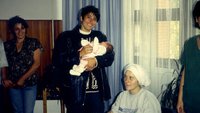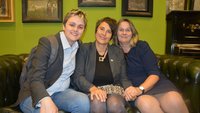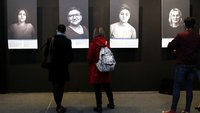Ajna Jusić from Forgotten Children of War, Bosnia: “We are changing this country in a good way.”
Ajna, your life is closely connected to medica mondiale. There is even a photo showing you as baby in the arms of Monika Hauser, the founder of medica mondiale. How would you describe your relationship with medica mondiale?
This connection is very important to me. medica mondiale helped my mother after she survived and went to a safe house. When I found out that my mother had been raped during the Bosnian War and then I put the story together, it began to make sense: strong mother, strong daughter. The support my mother received has defined my life and will define it in the future. I was born at Medica Zenica and I still know people from that time, who are like family to me. These connections are very strong. But to be honest: the most important thing I received from medica mondiale is the relationship to my mother. That is invaluable.
Are there any particular memories?
My most intense memory is from the year 2018, when I met Monika Hauser again after 25 years. We met up in Sarajevo and this is when we began our cooperation. Monika is a person whose respect I would like to have. I learnt a lot from her and would like to follow a similar path.
As a teenager you realised that you were a child born out of wartime rape. What changed for you after you found this out?
Everything. Absolutely everything. My relationship to my family, to my mother, to society, to my friends, to institutions. As a child I knew nothing about the background of medica mondiale and Medica Zenica. For me it was simply a safe place because of the war. When I found out I was a child born of rape, this made me become an adult and become stronger.
What did it mean to you when you found out who your father is?
At first, I only wanted to know his name. Dealing with authorities and school, for example, you are always asked for your father’s name. Then I did find out but it did not help me, because I still could not reveal this when asked. So that is the only thing which did not change with the new knowledge, even though it had actually been the only thing I wanted to know: his name.
How important is it for you to have contact with other children born of wartime rape?
Very, very important. We need someone we can trust with this information – someone who understands us. Quite often even psychologists do not know how to deal with this. There are things which our mothers do not tell us, but at least we children can share our feelings with each other. We are friends, like a family. By coming together we then also bring together our parents, uncles, aunts – this is also important for the process of peace in Bosnia and Herzegovina. As a group we have been able to find the strength to tell society about what happened to our mothers – so we are changing this country in a good way. I really believe this.
You are the Chair of the organisation Forgotten Children of War. What does your mother say about this activism?
When I told her about my plan, she was full of respect. I was in my early 20s and she respected my right to break the silence. My step-father did, too. Nonetheless, they were still scared when I told my story publicly for the first time. They did not want me to be judged by society or by the authorities. And they were worried because the perpetrators are still out there and free. I do not know their faces – but they know mine. Now she has learnt to accept my involvement. She has found her balance between acceptance and anxiety.
You work with a small team of paid staff and many volunteers at Forgotten Children of War. Together, you organise events for young people, you work artistically and politically, and you have set yourself the objectives of gaining more public attention for the children born out of rape. In this way, you aim to overcome their discrimination and stigmatisation. What is your greatest achievement so far?
Definitely the legal recognition in 2022 of children born out of wartime rapes. This gave us visibility. It is unique worldwide and has changed a lot. I am so proud we were part of this. It is not just a case of publicity: the issue is whether public institutions understand and accept that we are important partners whose views matter when it comes to our rights. We are now part of the process, and that is important.
What gives you the strength to do your work every day?
We have realised the state is not going to do enough on its own. We have to demand social justice – and together we can achieve it. That is my motivation, as is the public response to our commitment. We are not a target of hate speech – we are part of our society – we have found our place within it. That is what makes me proud.





